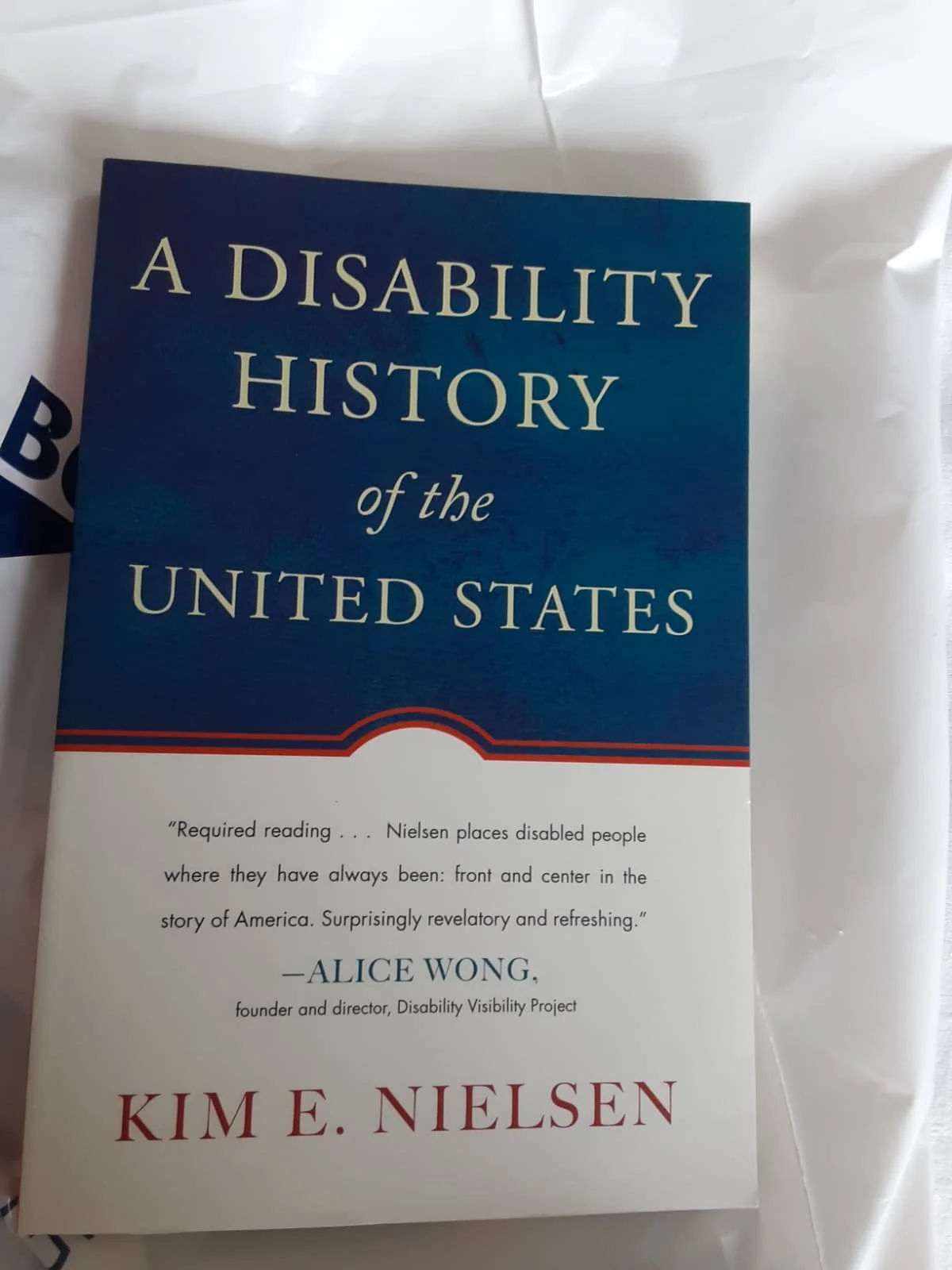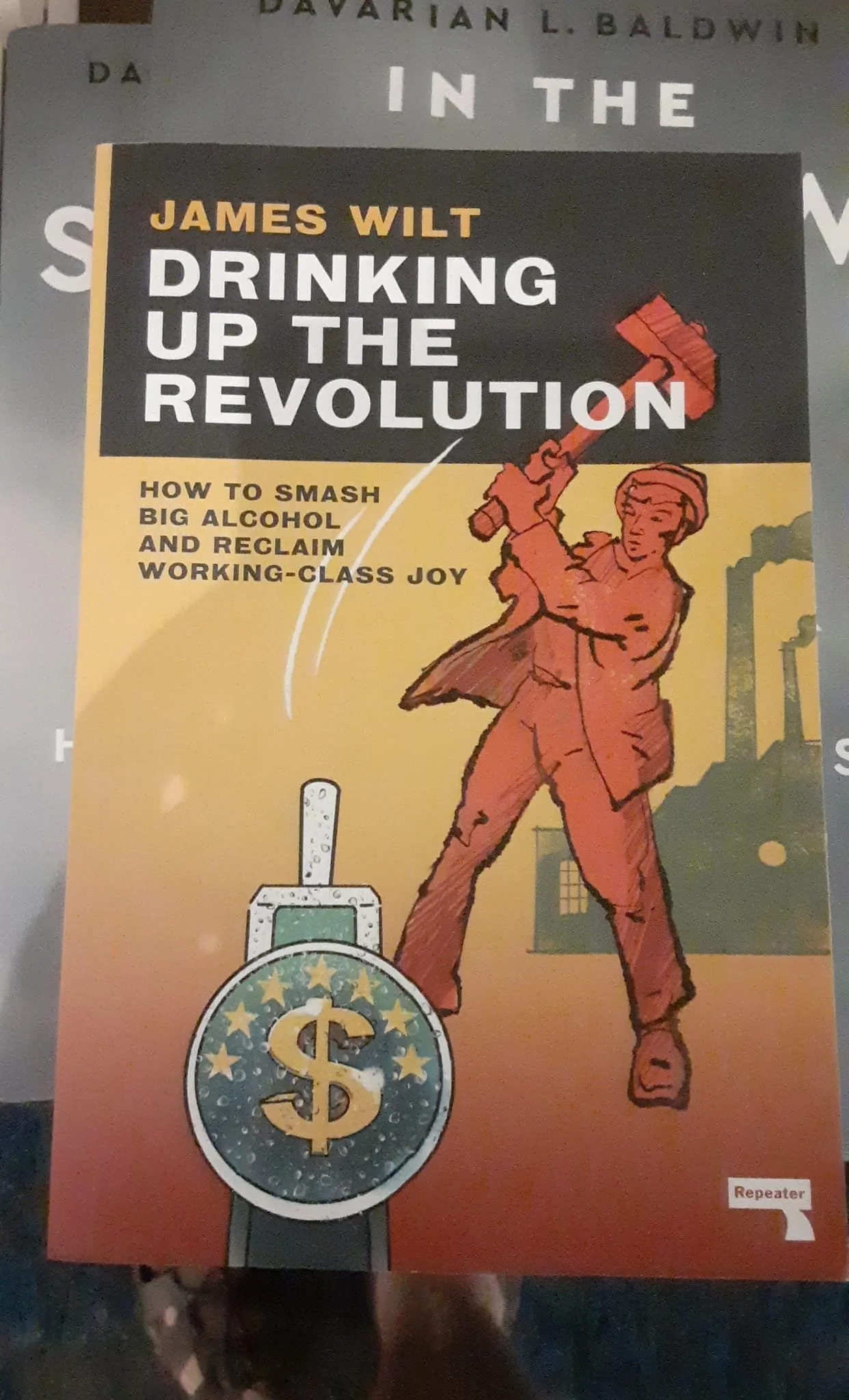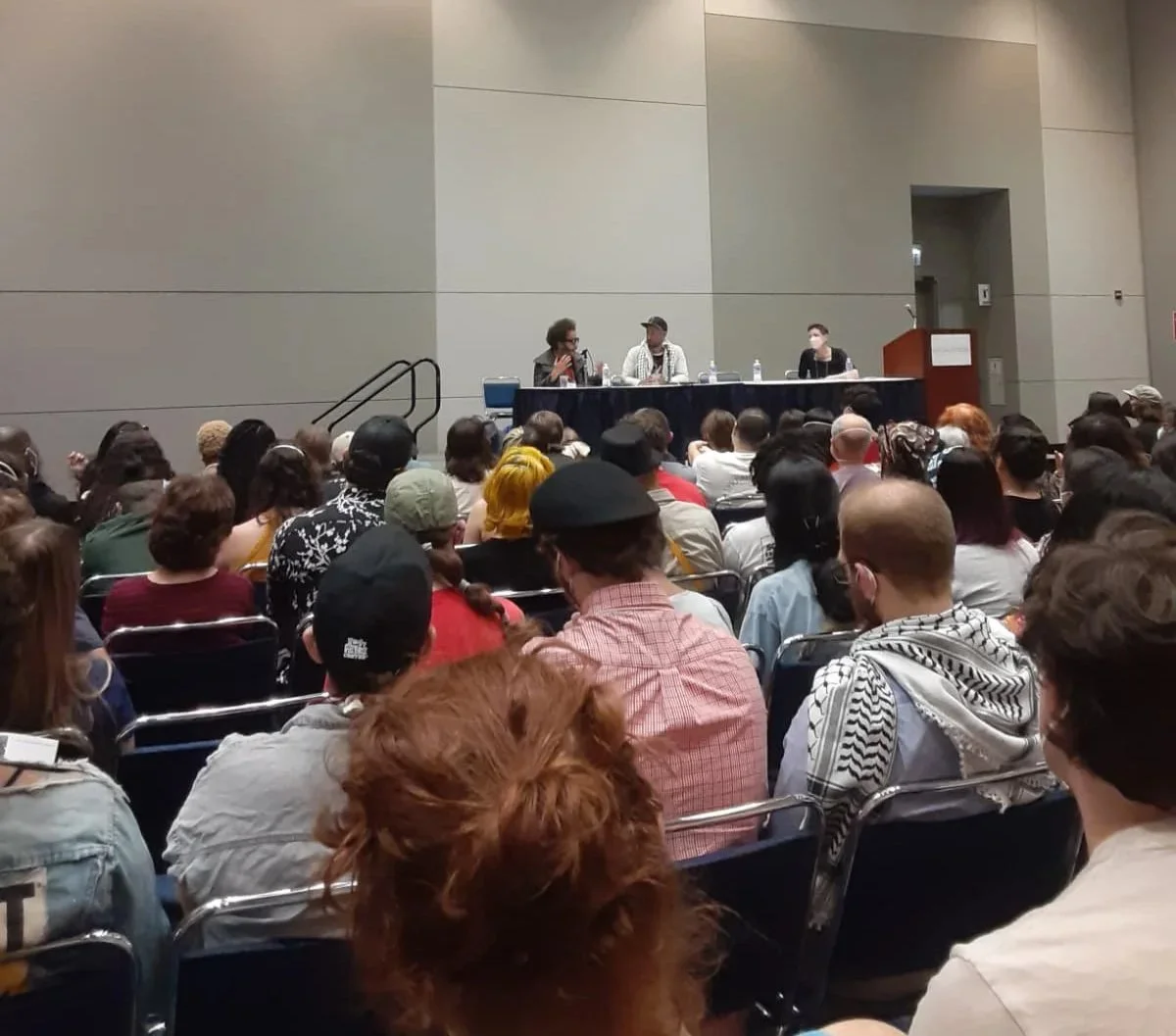‘What Radicalized You?’: Impressions from Socialism 2025
This article is the first in a series of three articles by Axel Fair-Schulz and Lettie Kazian on the Socialism Conference held in Chicago in July 2025.
During the long weekend of July 3-6, 2025, Left activists, scholars, and rank-and-file organizers gathered in Chicago at the annual Socialism Conference. The purpose of this conference is to provide a platform for exchange, debate, collaboration, and the development of new ideas, in addition to an exploration of the rich and complex legacy of socialist thought from the past.
Near the entrance of the Haymarket bookstore, set up especially for the conference, was a posterboard inviting attendees to post their answers to the question “What Radicalized You?” The answers ranged from food and job insecurity, low wages, lack of benefits, all the way to the endless wars of the American empire.
In our era of constant crises and deliberately engineered distractions to keep us on edge and disoriented, the Socialism Conference encourages rational debates, but not just about what is wrong with our world. While the latter is indeed very necessary and refreshing, it also moves from merely focusing on symptoms to analyzing underlying structural causes and, most importantly, addressing what can be done to change those power structures, creating a truly democratic, just, and sustainable world.
Spotlighting interconnected struggles for justice
The conference deliberately bridged very important theoretical considerations with what the revolutionary musician and film-maker Boots Riley called “the real shit” - the equally important questions of how to pay the bills in a world of poverty wages and inadequate or inaccessible health care, where the cost of a hospital visit could ruin one’s life financially. Over 40% of Americans are estimated to be one missed paycheck away from falling into poverty. Such statistics are deeply disturbing in the richest country on earth, a country that produces more than enough wealth to easily meet everyone’s material needs. The Socialism Conference examines the specific political and social campaigns that activists and grassroots movements need to build a better system.
In the official conference program, the organizers highlight politics, education, and community as central pillars, offering a diverse mix of panel sessions, film screenings, and musical performances featuring artists such as Songs for Liberation, a protest music collective from Chicago. To highlight some particularly pertinent key themes, there were plenaries (large gatherings of all conference participants in the evenings), focusing on timely topics such as Labor and Community Organizing Against the MAGA Billionaire Agenda; Fighting Fascism: Lessons from the Colonies; and All Our Movements in this Together.
The latter, which served as the closing plenary on Saturday, argued that ending the deeply undemocratic and exploitative rule of capitalist oligarchs, here in the United States and beyond, requires coordination, collaboration, and cooperation among all progressive movements as they advocate for social, racial, environmental, and sexual justice.
Some of the featured sessions at the Socialism 2025 conference. (Socialism Conference on Bluesky)
The quality and quantity of the specific panels (160) was remarkable, including meetings on labor and workplace struggles, reproductive justice, Black Lives Matter, gender, sexuality, anti-colonial political education, state violence GI resistance, the struggle for a free Syria after Assad, trans rights, climate justice, freedom for Palestine, and state repression in Russia, to name but a few. Entertainment was also provided in events such as Radical Trivia Night, Radical Game Night, as well as daily morning Yoga on the conference center lawn. There were also several skill-sharing sessions, such as DIY abortion, de-arrest training, and supporting each other “when things fall apart.”
“The end of history”?
An annual tradition drawing participants from all over the world, this conference was originally set up and run by the International Socialist Organization (ISO) until its dissolution in 2018, when an alliance of new sponsors took over. Chief among those organizations that sustain the conference today is Haymarket Books of Chicago. It is also supported by 95 other organizations, publishing houses, journals, community groups, and educational foundations. Among those are Verso Books/London, Pluto Press/London, Rosa Luxemburg Foundation/NYC, In These Times, CounterPunch, Jewish Currents, Chicago for Abortion Rights, Chicago Cuba Coalition, Railroad Workers United, and the Democratic Socialists of America (DSA).
Some of the books on display at the conference. (Photos: Axel Fair-Schulz)
When the Soviet Bloc collapsed in 1989, followed by the dissolution of the USSR from the world stage in 1991, most observers at the time concluded that all socialist projects would be hopeless causes, forever consigned to the dustbin of history. A barrage of books of varied quality aggressively propagated that interpretation. Among the intellectually most serious and influential were Francis Fukuyama’s The End of History and Anthony Giddens’ Beyond Left and Right. Both books, as well as their numerous lesser cousins, proclaimed the victory of capitalist economics and liberal democracy – usually by presupposing the latter rather than analyzing a far more complex and contradictory reality.
The entire planet was supposed to embrace the Western and American “Way of Life,” which – while requiring some minor tweaking from time to time – was to be the final stage in the socio-political and economic evolution of humanity. Thus, the presumed burial of all post-capitalist dreams was meant to be legitimized by the assertion of a liberal-capitalist utopia, which disguised its own utopian and teleological nature by presenting itself as simply post-ideological pragmatism. Whoever remained a socialist, at that time, had compelling reasons to feel rather isolated.
A socialist resurgence
Some thirty years later, the confident swagger of the liberal-capitalist triumphalists has faded considerably. Support for the once-dead socialist alternative to capitalism is growing markedly. And not only in intellectual circles, where erstwhile Liberal defenders of capitalism have been transformed into champions of socialism. In his recent book Time for Socialism: Dispatches from a World on Fire, French economist Thomas Piketty commented on how unthinkable the label of socialist seemed to him in the 1990s. Today, however, no serious person can deny any longer the fundamental defects and pathologies of capitalism and its irreconcilability with long-term human survival.
Similarly, while adopting the label of being a socialist was for many decades a death sentence in US politics, figures such as Bernie Sanders, Alexandria Ocasio-Cortez (popularly known as AOC), Rashida Tlaib, and Zohran Mamdani have attracted a mass following in recent years.
A scene from one of the sessions at the Socialism 2025 Conference. (Photo: Axel Fair-Schulz)
All of this illustrates the growing hunger for a true alternative to capitalist greed, irrationality, and destructiveness. Our world today is facing several concurrent crises, ranging from the global climate emergency to socio-economic inequalities, which constitute a clear and present danger to whatever limited forms of democracy have been allowed to develop under capitalism. Several decades of neo-liberal austerity policies, combined with the systematic gutting of social and cultural programs that average Americans have relied on since the New Deal, have fueled mass discontent with the capitalist status quo.
While there has been considerable growth on the Left beyond the confines of mainstream liberalism (as exemplified by the 2011 Wisconsin State Capital protests, the Occupy Wall Street movement, and Bernie Sanders’s subsequent run for the Democratic nomination in 2016 and 2020 under the banner of Democratic Socialism), much of the anger and confusion unleashed by over forty years of neo-liberal economics have resulted in the growth and mainstreaming of far-right and even neo-Fascist/post-Fascist ideologies. The fact that a cartoonish and predatory oligarch like Donald Trump was elected twice to the presidency, the second time even with a plurality of the popular vote, speaks volumes about the breakdown of the American political system.
Climate crisis is capitalist crisis
All of this takes place within an even larger dynamic of destruction and disintegration. Critical planetary boundaries are being crossed and thresholds reached, ushering in a new era of climate instability. The geological epoch, defined as the Holocene, spanning the last 11,500 years or so, has been replaced with what many leading climate scientists have aptly named the Anthropocene – a new age where human behavior is the primary factor influencing our planet’s climate. While the Holocene’s relative climate stability allowed for the development of agriculture, urbanization, and the rise of large-scale societies, the new Anthropocene seems much more reminiscent of the pre-Holocene/Pleistocene Epoch, which witnessed several Ice Ages and far more drastic fluctuations in temperatures.
Increasing average temperatures, ocean acidification, the dramatic loss of bio-diversity, and overall disruptions in what Karl Marx called the universal metabolism of nature are not the fault of all humans in equal measure but derive directly from the core logic of the capitalist mode of accumulation, where the demand for endless economic growth collides with the ecological limits of what our earth’s system can absorb. Capitalism is also structured around profit maximization for a relatively small minority of capital owners, at the expense of fulfilling genuine human needs for the vast majority of the world’s population.
This deep crisis shows that the dominant socio-economic and political structures of capitalism are not just inadequate - they are the core problem. Another world is urgently necessary and possible. Events like the Socialism Conference compel us to confront this through political education and collective support, skill sharing, and debate.









